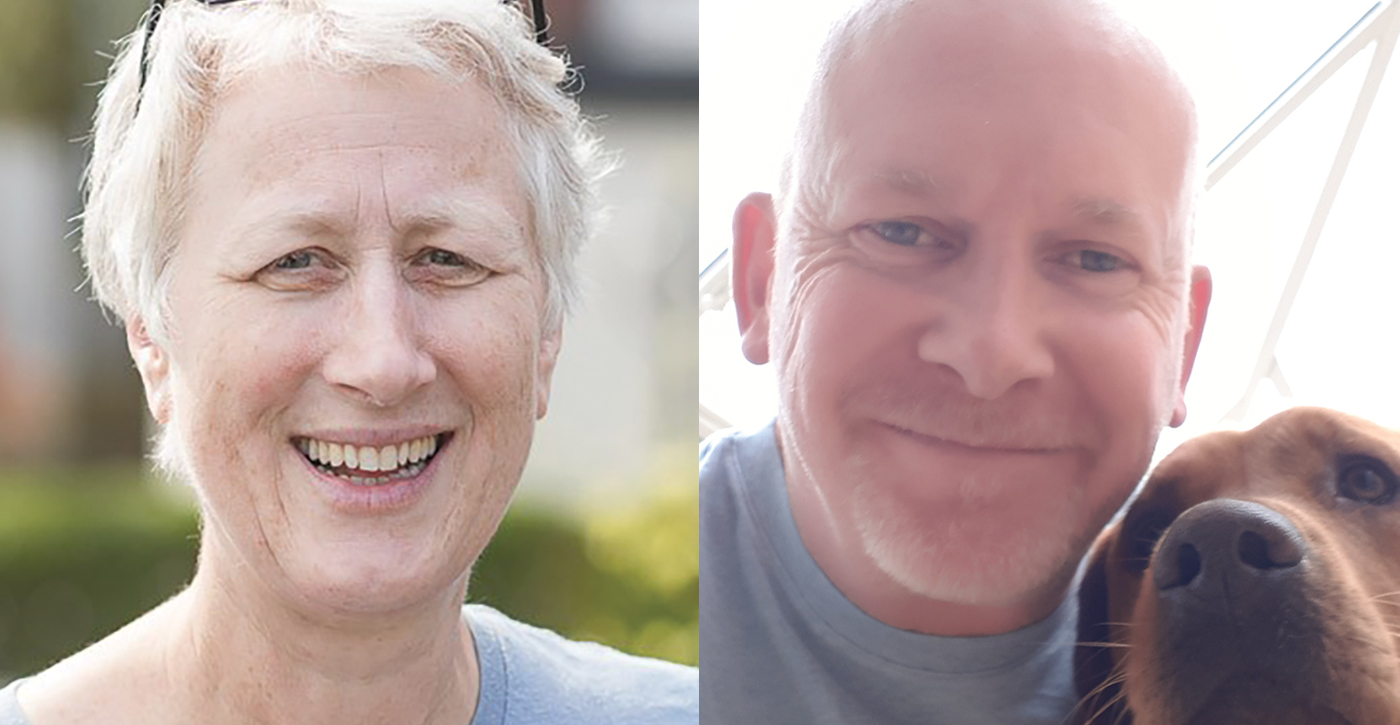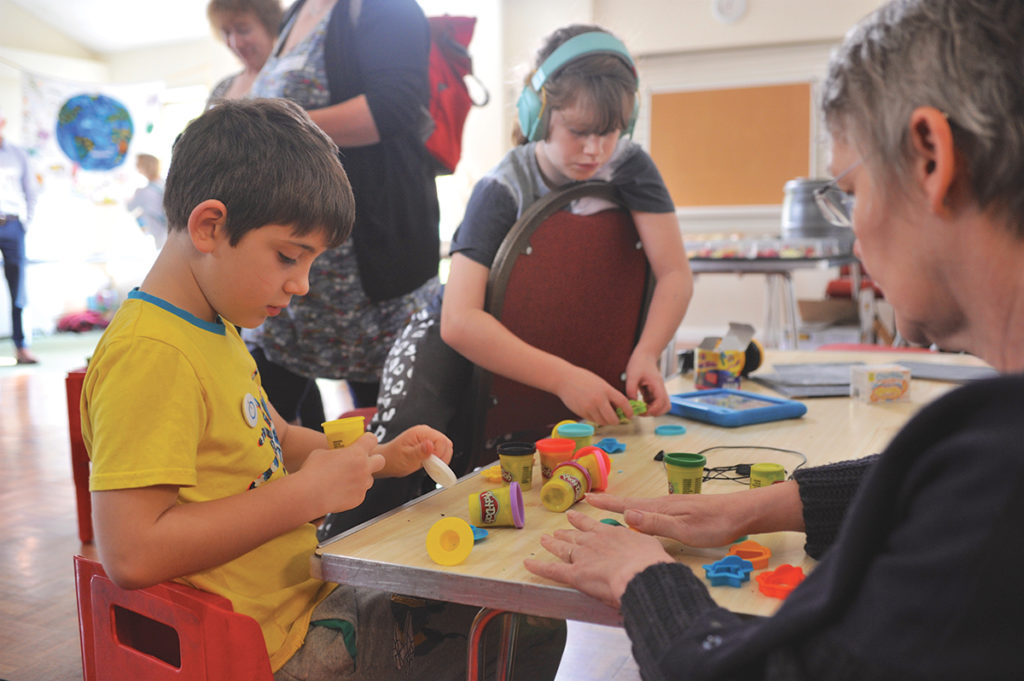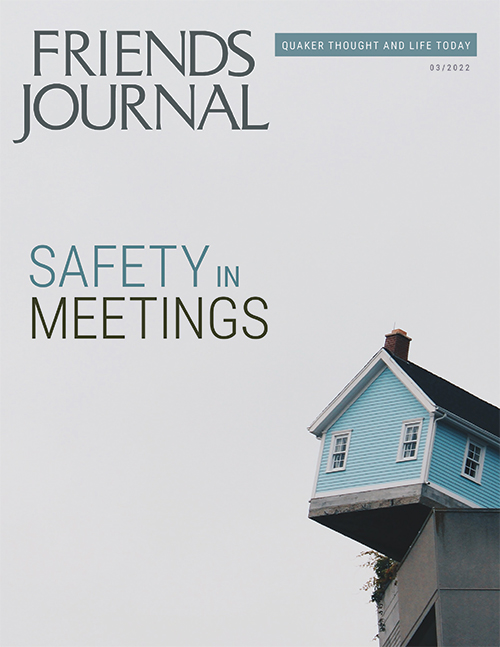Building a Culture of Safety
March 1, 2022
By Windy Cooler

Photos courtesy of the author
An Interview with Juliet Prager and Mark Mitchell of Britain Yearly Meeting
Quakers in Britain Yearly Meeting (BYM) have welcomed a government investigation of child sexual abuse and the Independent Inquiry into Child Sexual Abuse (IICSA), and they have created new processes and a staff position to prevent and respond to abuse in the yearly meeting. According to Paul Parker, BYM’s recording clerk, the September 2021 IICSA report
is building the case for change and improvements in how institutions must protect children, learning from the past and drawing on the experiences of victims and survivors. Quakers in Britain see this as important work and we uphold everyone involved.
In December 2021, our news co-editor, Windy Cooler, sat down with Juliet Prager, BYM’s deputy recording clerk, and Mark Mitchell, BYM’s new staff safeguarding officer, to talk about what Quakers in Britain have discerned as a result of the IICSA report as well as their recent work to protect vulnerable people in their yearly meeting.
For more information about BYM’s safeguarding work, see: quaker.org.uk/our-organisation/safeguarding/concern-abuse
Windy Cooler: I wonder if you can talk some about how BYM discerned how to participate in the government study, the Independent Inquiry Into Child Sexual Abuse?
Juliet Prager: We had heard this investigation was happening in Britain. There’s been a lot of concern about child sexual abuse over a number of years. A national inquiry has been set up to look at what’s actually been happening but mostly to recommend improvements across the whole of society.
We received a formal letter from the inquiry saying that they were asking us to make a witness statement. And our understanding was that that was a statutory requirement.
As you know, Quakers are not averse to breaking the law if we feel it’s appropriate. But actually, we felt that the inquiry was absolutely on the right lines. It’s a very survivor-led program. They’re putting a lot of effort into making sure that the voice of survivors is heard and used to improve things.
It took a lot more effort to comply than we had expected: we had to get a lot of data together. But we didn’t bat an eyelid, because we felt completely aligned with IICSA.
WC: What was the most surprising thing that Britain Yearly Meeting learned about itself as a result of this collaboration with the government?
JP: Our national records were incomplete and difficult to dig through. A lot of the data was written on scraps of paper and put into secure folders in envelopes in the library. Scraps of paper! You couldn’t really find out any story through those.
We realized this wasn’t good enough. We have quite a lot of meetings where individuals have met Quakers through their experience of being in prison, and when they come out of prison, they’re hoping to join a Quaker meeting. We have a system for this sort of situation. We have an arrangement where we set up a contract, a very individualized contract. But we realized we had no way of knowing whether Person A would move from one meeting to another, or any way of being sure that the new meeting knew about their story and was protecting them as well as the people that might be vulnerable in the meeting.
The IICSA report into Child Protection in Religions Organizations and Settings gave us some really useful insights into the barriers to safeguarding. For instance, there’s quite an assumption that Quakers are different from other faith bodies. I think quite subtly Quakers are distrustful of external authority, and that might make some Quakers concerned about going to the authorities when things happen in their community.
Mark Mitchell: In time, we’re going to have a lot of data from right across Britain. In time, all safeguarding incidents will be on a central database, but that’s going to take quite a while to achieve. Certainly, that’s something very positive that’s come from the report.

WC: I wonder if there’s any more to say about the discernment process. As you learned what you might want to do differently, how did you take that to the community for discernment, and what did that feel like for you?
JP: We were asked to respond on behalf of the church, not the charity—the whole church of Quakers in Britain. And therefore, the recording clerk is empowered to sign the witness statement on behalf of the church. So that’s what he did, having gathered information.
We have a national body called Meeting for Sufferings, which is the national representative council that meets between yearly meetings. So we kept that group informed and gave it the opportunity to engage; we told them about what was happening, what was being done.
There wasn’t a lot of engagement at Meeting for Sufferings, although there were some interesting contributions. When the report from IICSA came out, we took that to Meeting for Sufferings. And we had perhaps a little more engagement with Friends at that meeting saying, “I’d like to remind us all that these things can happen in Quaker community.”
It’s very iterative discernment, as we encourage and support meetings to go through their own discernment. We change the guidance that we give on that basis; that makes sense. It’s not been a national yearly meeting asking whether or not we should do this; it’s been a slow journey.
What has hugely helped discernment are the contributions of Friends who have lived with the experience of abuse. Having experienced this themselves in their work or their voluntary lives—or their children having experienced abuse—their sharing makes a massive difference. When Friends speak of their own experience, we can’t any longer say that it doesn’t happen to us or near us. Also not just that it happens, but they also can speak of their experience of what works to prevent abuse, and what supports people who have experienced abuse.
MM: You need to have created a safeguarding culture for people to feel free to come forward and share their experiences in the first place.
JP: A few years ago, Meeting for Sufferings set out a document called “Our Faith in the Future.” It was a set of aspirations for Quaker meetings and asked: What are we all working towards? What would we love our meetings to be like?
One of the six headlines read: “Meeting for worship is loving, inclusive, and all-age.” I’m clear that you can’t have a loving and genuinely inclusive and all-age meeting for worship and meeting community unless every person that comes to that community is as safe and as nurtured as possible. We were taking our cue also from the discernment of our Meeting for Sufferings in that way.
WC: It looks like you’ve expanded your concern from preventing and healing from sexual abuse to abuse of all kinds. Is that fair to say? And if so, can you tell me more about that?
MM: “Safeguarding” is preventing vulnerable groups from any type of harm, not just sexual abuse. So the abuse could be physical, emotional, or financial, the sort of abuse that some of the elder people in our communities tend to suffer.
It’s a far broader matter that we have to work with than sexual abuse. It’s harm, and that comes in lots of different forms. That’s why we have to be so careful about the processes and procedures that we recommend, so that they do cover all eventualities and different types of harm to the vulnerable groups that we’re dealing with.
JP: I think it’s fair to say that this is just standard, that is, how we accept things in British society now. There’s a standard in schools, in our social support networks, and in charities. We’ve got legal definitions of abuse which include all of these things, and it’s pretty standard for most of us that work in this area.
WC: How did you find the courage to respond to any resistance you have encountered in local meetings or the yearly meeting?
JP: For me, this goes back to the point I was making about learning about people who, in whatever way, have been abused; then you know that you have to stop it from happening again. So it’s never been something that I’ve needed courage for. The thought that my child, the foster children who I was looking after, or any of the other kids in the meeting might come to any harm in our meeting was just not—you just don’t go there.
I want meetings to be loving, inclusive, and all-age. And for the ex-offender or the potential offender, I want them to be fully part of our meeting. That can only happen if there are safeguards around them.
It’s challenging sometimes. Sometimes I’ve been in slightly strange circumstances: for example, the situation with the Friend who just wants to believe everything’s all right, or the person who’s just found Quakers and thinks that we’re all the best people in the world. It doesn’t take a lot of courage to talk to those people and say, “Let’s all just work on this and get it right.”
MM: Yes. I think we would need more courage if we were going against the grain. There is now such a national push towards safeguarding in all sorts of organizations. We’re not standing out and making ourselves unpopular; we’re doing what is accepted as being the right thing.
To keep people safe, you cannot rely solely on Christian values of love, trust, and forgiveness, because human nature dictates that people sometimes do bad things. So we need to withhold a little of that trust and think: what if? If something bad does happen, we need to know that we did everything in our power to prevent it happening.
WC: As you consider all the ways in which you have responded to abuse as Britain Yearly Meeting, can you reflect on what has been the most successful and also what has been disappointing or hard?
MM: Focusing on the survivor is nearly always successful. So if everything you do is focused on the welfare of the child or the welfare of the vulnerable people, then you can’t go far wrong.
JP: Well, I think this is about building a culture of inclusivity and of safe inclusivity. Where that’s worked, it’s been great. I think it’s fair to say that resistance often tends to come from people who are scared: they don’t know what this is; they don’t know what it means. People jump to conclusions.
There have been some hard conversations along the way. Our approach is to be persistent and clear. Sometimes in a local meeting that means somebody steps down from a role before you can shift the culture. Sometimes it means lots of waiting and making sure that, in the meantime, nobody’s at risk.
WC: When you imagine the future of Britain Yearly Meeting, how do you see this safeguarding program being a part of that?
JP: There will be more improvements to make as we understand more about how to do this and how to keep people safe.
We’ve allocated some national resources, and we’ve got clear guidance and support for local communities. We do see the need for better training for Quaker meetings and bringing people together.
We need to improve safeguarding for vulnerable adults. For example, it’s been clear that people appointed to children’s committees or running children’s meetings should be background checked, and there should be some extra safeguards around them. But what do you do in a meeting where you might have a Friend visiting vulnerable elderly people at home? Or when a Friend in a leadership position, like a clerk or elder, and a new vulnerable person sees them as an impressive person holding power? So we’ve set out guidelines, which suggest safe recruitment and safe appointment processes.
That can be done simply by following good process, which is to talk through the job with the individual: “Do you know that this is what being the clerk involves? Are we on the same page here? Have you any experience with this before? If not, what support might you need?”
That’s good practice for all nominations. Unfortunately, because meetings are burdened, quite often it is instead, “Well, who’s going to be the clerk?” But it’s good Quaker practice to explore and discern with somebody whether they should be a role model or not: to ask about their gifts and to nurture their gifts.
MM: If you just write down everything that’s required, it looks onerous. It looks too hard for some smaller meetings. However, it could be a matter of a five-minute conversation rather than calling it a job interview.
WC: If you were to tell Quakers in other yearly meetings anything more about this journey, what would it be?
MM: I would tell them to keep people safe. You cannot rely solely on Christian values of love, trust, and forgiveness, because human nature dictates that people sometimes do bad things. So we need to withhold a little of that trust and think: what if? If something bad does happen, we need to know that we did everything in our power to prevent it happening.
JP: Be of good heart. I think this is really worth doing. It’s not as scary as people think it’s going to be. It’s just one of many things that we need to do to have thriving and growing meetings, which is what we all want.

March 2022
Safety in Meetings
Building
Features
Click to share on Facebook (Opens in new window)
Click to share on Twitter (Opens in new window)
Windy Cooler
Windy Cooler serves with her husband, Erik Hanson, as a co-editor of Friends Journal's news section. She is an “embraced public Friend,” her ministry of caregiving held under the care of Sandy Spring (Md.) Meeting. She is also a doctoral candidate at Lancaster Theological Seminary and has visited Quakers across the United States as a pastoral care educator and researcher.
